|
|
|
Sort Order |
|
|
|
Items / Page
|
|
|
|
|
|
|
| Srl | Item |
| 1 |
ID:
133804
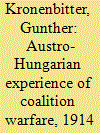

|
|
|
|
|
| Publication |
2014.
|
| Summary/Abstract |
Austria-Hungary's experience of Germany's junior partner was fraught with misunderstandings and a failure to devise a coherent common strategy
While the Anglo-French experience of coalition warfare during the First World War has been the subject of many English-language volumes, Austria-Hungary's relationship with Germany - its senior partner within the Triple Alliance - has been underexplored. In this article, Günther Kronenbitter analyses the uneasy dynamics of this alliance, tracing it through the two countries' wilfully blinkered, thirty-year preparations for a war that eventually came in August 1914, before exploring their increasingly fraught and inadequate efforts to co-ordinate their campaigns and resources - a process marked by resentment and, more importantly, a failure to take a unified strategic approach.
|
|
|
|
|
|
|
|
|
|
|
|
|
|
|
|
| 2 |
ID:
014390
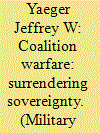

|
|
|
|
|
| Publication |
Nov 1992.
|
| Description |
51-63
|
|
|
|
|
|
|
|
|
|
|
|
|
|
|
|
| 3 |
ID:
186091
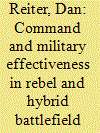

|
|
|
|
|
| Summary/Abstract |
Conventional thinking frames battlefield coalitions as collections of national armies fighting together as multinational coalitions. However, wars also include rebel groups fighting together as coalitions, and rebel groups fighting alongside states in hybrid coalitions. This paper seeks to better understand rebel and hybrid battlefield coalitions, focusing on command and operational military effectiveness. The paper first presents basic ideas about coalition command and military effectiveness from conventional wisdom on multinational coalitions. It then builds on these ideas to explore potential similarities and differences between multinational coalitions on one hand and rebel and hybrid coalitions on the other. In particular, the paper focuses on the nature of different command structures, the varying operational military effectiveness advantages for unified coalition command, and the political motivations for coalition members to resist creating unified command, despite potential effectiveness benefits. The paper concludes by providing policy recommendations to states who lead hybrid coalitions.
|
|
|
|
|
|
|
|
|
|
|
|
|
|
|
|
| 4 |
ID:
166604
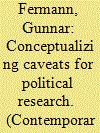

|
|
|
|
|
| Summary/Abstract |
The upsurge in post-Cold War coalition operations has stimulated research on caveats: national reservations on the use of force in multinational military operations. However, because the concept of caveats has no agreed-upon definition, it is used inconsistently. This in turn impedes comparing research findings across academic and policy studies and therefore systematic research. This article is a contribution to the scholarly debate on how the analytical concept of caveats are to be delimited. Crucially, we argue that caveats result from some calculated political decision, and should not be confused with reserved behavior due to financial and technical limitations, or lack of coordination. We suggest that caveats are empirically observed and measured in two ways: First, we argue that coalition rules of engagement should be used as a yardstick for measuring direct reservations on the use of force. Second, we suggest reservations on task-assignment and geographical mobility should be used to register indirect reservations.
|
|
|
|
|
|
|
|
|
|
|
|
|
|
|
|
| 5 |
ID:
156086
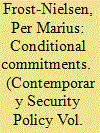

|
|
|
|
|
| Summary/Abstract |
Why do states make substantial military contributions to coalition operations, while at the same time apply reservations, or caveats, to how the coalition can use the military contributions? Caveats rose to prominence in defense and policy circles with NATO’s campaign in Afghanistan. In the scholarly security literature, the term remains a buzzword for all types of reserved efforts by states in coalition warfare, but there are few theoretical accounts addressing caveats. This article contributes to the knowledge gap on caveats through a comparative case study of Denmark’s, the Netherlands’, and Norway’s contributions to NATO’s intervention in Libya in 2011. It demonstrates that caveats can occur through three different causal pathways: compromises from domestic bargaining, handling of alliance commitments, and implementation and civil–military relations. Insights into the complexity that causes caveats are highly relevant for both political and military decision-makers that are trying to coordinate states’ effort in coalition operations.
|
|
|
|
|
|
|
|
|
|
|
|
|
|
|
|
| 6 |
ID:
156551
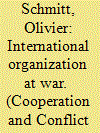

|
|
|
|
|
| Summary/Abstract |
This article investigates the NATO campaign in Afghanistan through a practice-based approach. The structural distribution of power within NATO, which is obviously in favor of the US, does not automatically lead to Washington’s desired outcomes, and US delegates must competently perform a certain number of practices for their power advantage to take its full effect. The article also illustrates how looking at practices helps to explain policy decisions, such as NATO’s decision to engage in Afghanistan, the establishment of an International Security and Assistance Force (ISAF) strategy and the wording of policy papers. By studying a case of military diplomacy, the article contributes to the emerging scholarship aimed at bridging the gap between diplomatic studies and practice-based approaches to International Relations.
|
|
|
|
|
|
|
|
|
|
|
|
|
|
|
|
| 7 |
ID:
138434
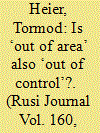

|
|
|
|
|
| Summary/Abstract |
Small states that participate in coalition warfare find it increasingly difficult to maintain control over their armed forces. With the larger allies, such as the US, the UK and France, dominating military command structures, small states have become tactical providers of sophisticated force and, as such, enjoy little influence over strategy or campaign plans. Tormod Heier argues that NATO's 2011 intervention in Libya illustrates this problem well: smaller states such as Norway were compelled to navigate the differing interests of the UN and NATO while larger allies stretched the UN mandate towards regime change – leading Norway to terminate its mission early.
|
|
|
|
|
|
|
|
|
|
|
|
|
|
|
|
| 8 |
ID:
177813
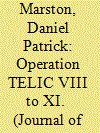

|
|
|
|
|
| Summary/Abstract |
This paper analyzes the complexity of coalition warfare in the twenty-first century through the prism of the British Army’s experiences in Multi-National Division South East (MND SE) and Basra in the Iraq War. Considered as a case study, this range of operations encompasses a range of experiences, from breakdowns in dealing with shifting national interests and aims and linkages to PJHQ, to working within a coalition with the US and Iraq and communicating shifting national interests, to demonstrating a clear understanding of the character of the war in which MND SE was engaged.
|
|
|
|
|
|
|
|
|
|
|
|
|
|
|
|
| 9 |
ID:
166606
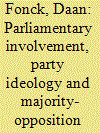

|
|
|
|
|
| Summary/Abstract |
This article examines the impact of parliamentary involvement in troop deployment decisions on restrictions on military mandates by examining the Belgian contribution to the 2011 Libya intervention and the coalition against the self-proclaimed Islamic State. More specifically, we analyse (1) the effect of party ideology on mandate preferences, and (2) the impact of bargaining between majority and opposition parties on the outcome of mandate negotiations. Our case study demonstrates that left-wing parties show a strong inclination toward imposing restrictions on the use of military force beyond humanitarian goals, while right-wing preferences tend to depend on the national interests at stake in the operation. With regard to majority-opposition bargaining, our study shows that the impact of opposition parties is dependent on the degree of contention between government and opposition parties, as well as on the extent to which the executive needs to seek support across its own majority.
|
|
|
|
|
|
|
|
|
|
|
|
|
|
|
|
| 10 |
ID:
170273
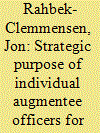

|
|
|
|
|
| Summary/Abstract |
This article examines the strategic purpose of Individual Augmentee Officers (IAOs) for junior partners in multinational military operations through an exploratory case study of Danish IAOs in Iraq and South Sudan between 2014 and 2017. IAOs are individual officers who are moved from their normal functions to be seconded to other units of the armed forces of their own or another country or an international institution. The study concludes that IAOs function as strategically important, yet not necessarily indispensable, supplements to military contingents in several ways: making tangible contributions to the overall mission (contributing), gaining access to information, knowledge, and experience (learning), and lobbying decision-making processes within mission headquarters (lobbying). The usefulness of IAOs depends on whether the junior partner has specific interests and a significant presence in the theatre and whether the mission is conducted as a UN mission, a NATO mission, or an ad hoc coalition.
|
|
|
|
|
|
|
|
|
|
|
|
|
|
|
|
|
|
|
|
|